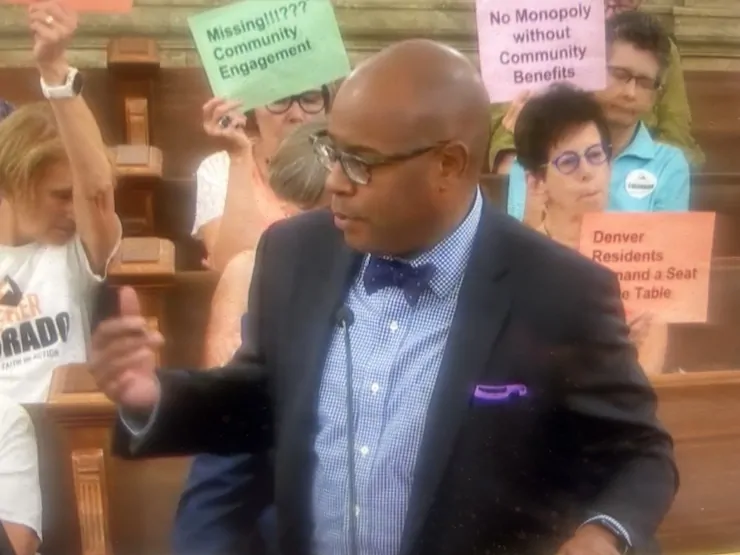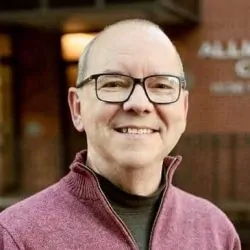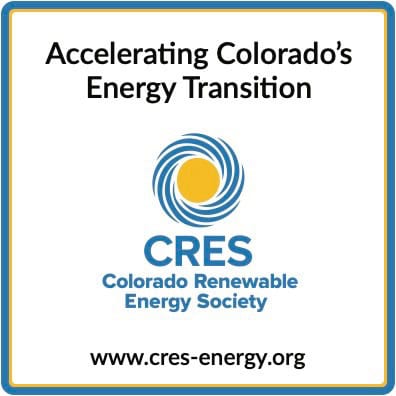Proposed franchise agreement fell short of what city needs for a hotter future and higher electricity bills
by Jeff Ackermann
Denver’s current franchise agreement with Xcel Energy leaves it ill-prepared for the future.
Xcel’s electric prices are projected to climb 50% during the next 5 years. And within 25 years, the Denver area could experience between 75 and 100 days of extreme heat per year, compared to fewer than 10 in recent years.
That will leave some Denver residents struggling with the cost of staying cool enough to function.
What should Denver do?
For over a year, Xcel Colorado has negotiated with Denver Mayor Mike Johnston and his team over revisions to the franchise agreement. All local governments negotiate these agreements with for-profit utilities, usually on a 20-year term. They address land uses, cost sharing, and electric service for public uses such as street and traffic lights.
Negotiations in 2006 yielded a companion agreement addressing the needs of Xcel’s customers in Denver, particularly homes and businesses over-burdened by utility costs.
The decision the Denver City Council will make this month will have repercussions that ripple for decades to come, an era when life will be hotter and the city will face unforeseen pressures. Electricity costs will almost certainly be higher than today.
Whatever the council decides to include in the 2026 companion agreement, a legal contract, will lock in Xcel’s commitments to its Denver customers beyond basic service delivery into 2046. What I have seen so far undercuts the public good and hamstrings Denver’s ability to brace against a hotter future.
And while the 2006 version was precedent-setting, this time Xcel doesn’t think Denver residents have any unmet needs. The mayor’s team agreed. That didn’t sit well with community advocates and several city council members.
The current franchise agreement expires at the end of 2026. By law the deal must go before the city’s voters for approval. Xcel and the mayor would like the agreement to be voted on in November 2025. But the city council must first agree to put it on the ballot. That was the proposal before the council on July 25, along with a very anemic companion agreement.
What negotiators privately may have presumed to be a smooth path to approval hit a major obstacle at the meeting.
Together Colorado, a group I help lead, and our allies, criticized the company and city leadership for tepid public engagement and pinpointed the mayor’s flimsy efforts to safeguard the city’s interests, especially the poor and heat-sensitive. We worry about the growing energy burden upon the poor, for whom electricity bills can be financially crushing. We see a need to assist those most vulnerable among us to stay cool in extreme heat.
Our immediate focus is on an improved process that can yield durable solutions. The proposed franchise agreement lacks any customer-focused solutions, not even a commitment to pursuing solutions.
Innovative rate design could reduce the rising energy burden on the poor. Dedicating city-owned solar electric output to recreation centers could result in heat emergency “relief facilities.” And many other community concerns could be not only identified but addressed with a better process.
s

Robert Kenney, the chief executive of Xcel Colorado, answered questions from the Denver City Council members at the council’s July 25 meeting.
Describing Xcel’s response to council member questions as underwhelming is a gross understatement. Robert Kenney, CEO of Xcel Colorado, contended that emails the company sent to Denver residential groups counted as “community engagement.” Kenney defended an agreement that only requires a “best faith effort” and lacks any precise promises as good enough, delaying any concrete commitments to help the poor and deflecting those responsibilities to state legislators and the Colorado Public Utilities Commission.
In that July council meeting, talk between the members, Xcel officials and average citizens ran past midnight. People were frustrated. Then the council called for a vote.
Council President Amanda Sandoval contrasted the proposed Xcel-Denver agreement and a different “community benefits agreement.” The latter often accompanies land developments. Separately, Sarah Parady, a council member, pressed Kenney to commit to outcomes-specific projects, but Kenney pledged nothing specific.
The night ended after the council voted 8-5 to support placing the franchise agreement on the November ballot. But that might not happen because council procedures require two separate votes. Support is soft and can be swayed, with four of the council members, who voted yes, saying they would vote no next time unless Xcel sincerely engages with the council and crafts a companion agreement with real community benefits.
These four sharply criticized Xcel officials. “The fact that you think we’re lucky to have you here to talk to us today is insulting,” Councilwoman Jamie Torres told Kenney.
Councilman Paul Kashmann was exasperated. “I am absolutely shocked at the blather of Xcel tonight, which I’ll summarize as absolutely no sincere interest in discussing anything meaningful,” he said. He went on to describe Xcel’s “meaningful dialogue” with the community as “absolute baloney.”
Kashman said: “It’s just the level of insincerity that I’m feeling tonight that really shocked me. I didn’t expect that.”
Councilman Darrel Watson, who entered the evening a firm supporter of Xcel, seemed to have shifted his perspective by night’s end.
“I am absolutely, absolutely disillusioned with what I sense is a lack of understanding (by Xcel) of what folks are saying.” Watson said. “You have here a supporter, someone who wanted to vote yes… and the more Xcel spoke the less I wanted to vote yes.”
A second vote on moving the franchise agreement to the November 2025 ballot is now scheduled for the council’s Aug. 11 meeting. The intent is to create an agreement that can gain majority support. The first draft shows promise but is not enough to satisfy my group. We want clear timetables to which Xcel and Denver can be held accountable.
A meaningful financial commitment by Xcel from its own funds, not additional charges on customers, is essential.
As Xcel noted in its remarks, it is a party to 128 franchise agreements. And while Xcel wants Denver to be a model of a franchise with no binding companion agreement, we see a different lesson emerging. As Councilwoman Torres told Xcel: “You have set a precedent in 2006.”
Our group and allies in the city want more in this next franchise agreement.
We, the people involved in Together Colorado and the communities we represent, look to raise up the pending agreement as a model for all communities to learn and benefit from, in service to promoting human dignity statewide.
For all Colorado communities, we will continue to champion what the communities expect: franchise agreements with genuine, measurable benefits delivered with respect to the public.
“The community is saying that we need more from our utility,” Watson said. We heartily agree.
Jeff Ackermann, a Denver resident, formerly served as chair of the Colorado Public Utilities Commission for four years. He is also a member of Together Colorado.
- Why Denver must stand up to Xcel Energy - August 9, 2025
- Big data centers can have upsides - October 7, 2024






